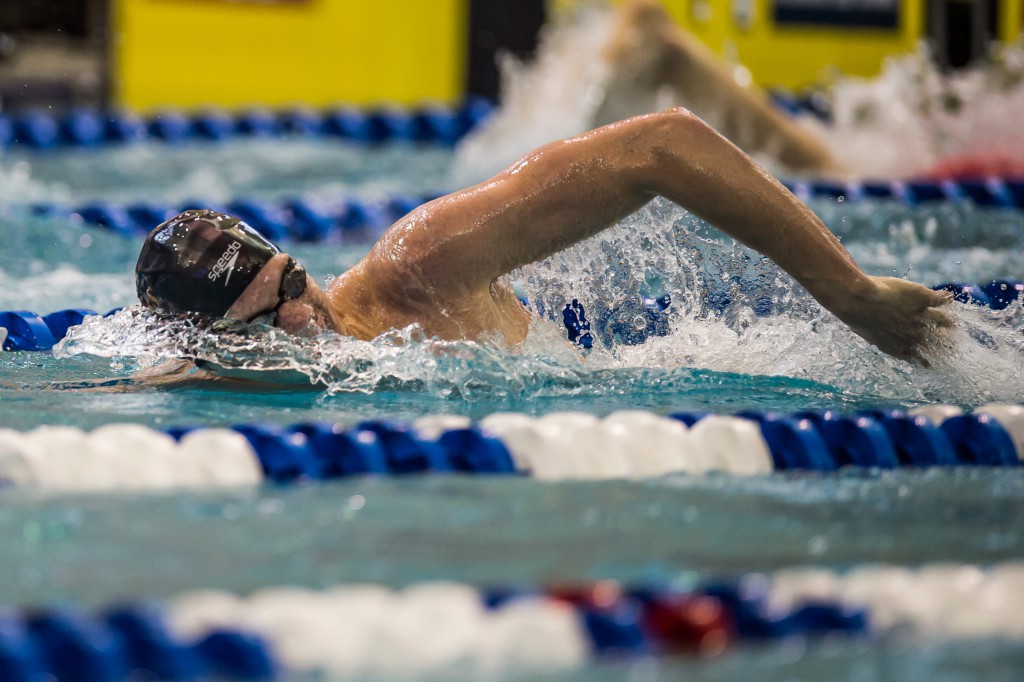Decade-Old U.S. Open Record in Jeopardy at NCAA Championships

NCAA DI Championship Editorial Coverage is proudly sponsored by Adidas. Visit All-American Swim for more information on our sponsor. For all the latest coverage, check out our event coverage page.
By David Rieder
Simon Burnett now coaches at the University of the Pacific, and last week he returned to the McAuley Aquatic Center at Georgia Tech for the women’s NCAA championships where he saw his own name inscribed on the pool record board. Still standing was the 1:31.20 that he clocked in the 200 free on March 24, 2006. Not only had no one swum faster in that pool, but nobody had ever gone faster, period.
That U.S. Open record survived the suit era and repeated attempts on its existence from the likes of Ricky Berens, David Walters, Scot Robison and others. Even Michael Wynada could not take it down despite splitting a 1:30.60 on a relay for the Michigan Wolverines in 2014. No way, the oldest men’s short course yards U.S. Open record and its accompanying pool mark finally meet an expiration date at this year’s meet, right?
Two days ago, no one would have dared argue with that statement. After every single Georgia Tech pool record went down at the women’s meet last week, this mark looked like the safest bet to last through the men’s. (Peter Vanderkaay’s 500 free pool record, also from 2006, ended up going untouched on Thursday.)
But two days into the meet, much has changed. Texas freshman Townley Haas posted the fastest split ever on the Longhorns’ record-setting 800 free relay on Wednesday, completing his eight laps in 1:30.52. He backed that up with an impressive win in the 500 free on Thursday, his 4:09.00 moving him up to fifth on the all-time list in the event.
But flat start, Haas’ best time remains the 1:33.19 which he is entered in for this meet, good for the ninth seed. He will need a big drop from that, but he did just knock off three-and-a-half seconds off his 500 free time in Thursday’s final. And he will have competition for the win from the likes of Simonas Bilis, Blake Pieroni and last year’s runner-up, Anders Nielsen, among others, but this freshman looks like the real deal and a virtual lock to challenge Burnett’s time at some point during his four years in burnt orange.
The Jack-and-Joe show… plus Caeleb. One year ago, Texas’ Joseph Schooling edged out teammate Jack Conger for the 100 fly NCAA title, 44.51 to 44.55, and Schooling also got the better off Conger in the 200 fly at that meet. The rivalry between the two teammates has not stopped there; Conger even admitted at this summer’s U.S. Nationals that despite his impressive 51.33 in the 100 fly, he was unhappy he could not surpass the 50.96 Schooling swam at the World Championships to earn a bronze medal.
Today that rivalry gets cranked up a few notches. First off, Austin Staab’s American and U.S. Open record might be in play this year, especially after Schooling’s blistering 43.34 relay split on Texas’ victorious 400 medley relay. And secondly, they might have some company in the form of Florida’s Caeleb Dressel.
Dressel is the only non-Texas swimmer so far to win a race at NCAAs, and it took an American record to do so, as Dressel clocked an 18.20 to win the 50 free on Friday night. Dressel enters the 100 fly with a seed time of 44.80, but with stiff competition he should be able to pull out at least a few more tenths. He has already shown that he has more power than any other swimmer in the world, and that does translate to a 100 fly short course, but does he have the endurance to hold his stroke together down the last 25?
If you’re looking for a race of the meet, Thursday night’s 200 IM might be tough to beat. If you need a refresher, Will Licon touched out Josh Prenot by a tenth of a second, with Ryan Murphy just behind. All three moved into the top-five all-time in the event. But if any race this weekend is going to surpass the IM on the scale of epic finishes, the 100 fly is your best bet.




.png)
Kyle van Niekerk Brent Szurdoki Ricky Ellis Trent Trent Panzera